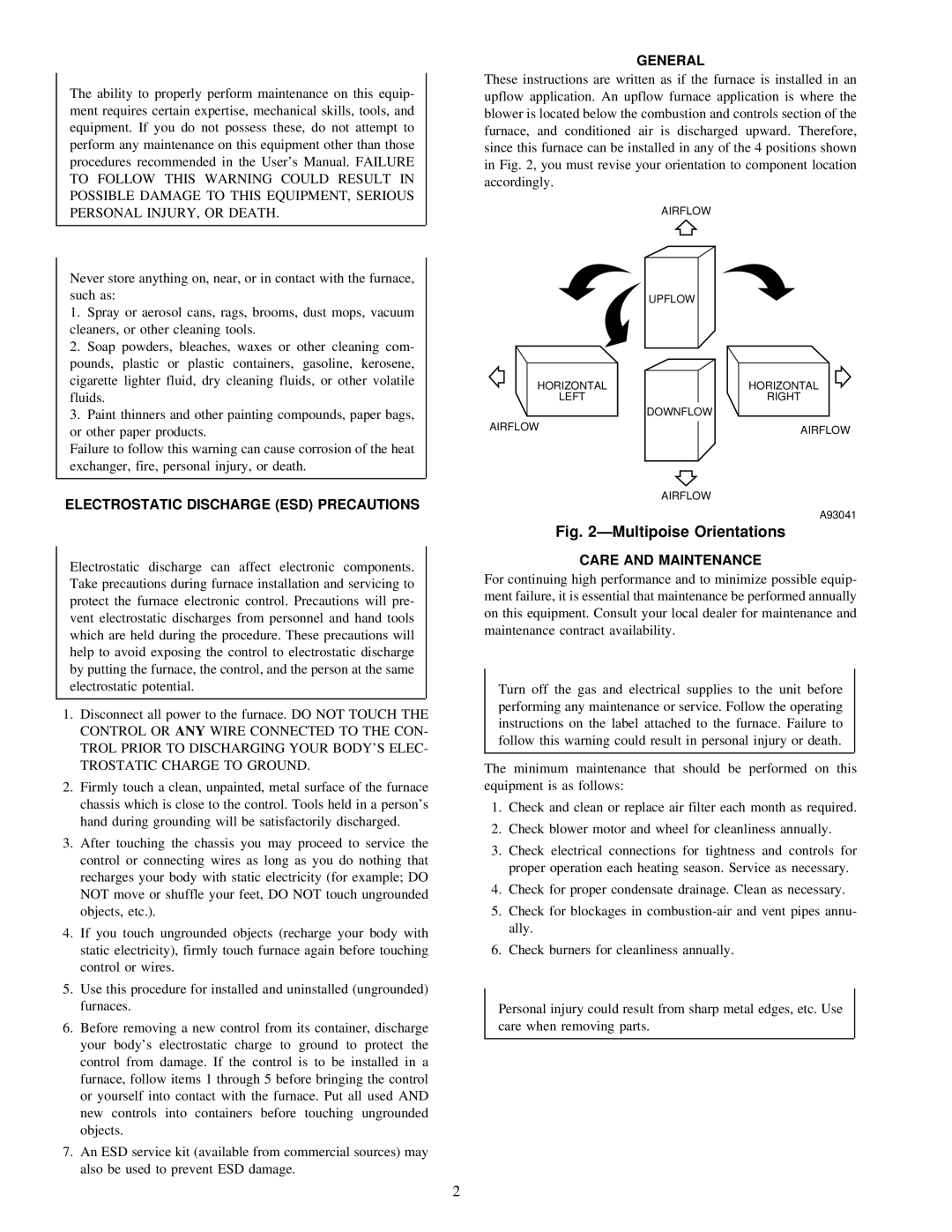
The ability to properly perform maintenance on this equip- ment requires certain expertise, mechanical skills, tools, and equipment. If you do not possess these, do not attempt to perform any maintenance on this equipment other than those procedures recommended in the User's Manual. FAILURE TO FOLLOW THIS WARNING COULD RESULT IN POSSIBLE DAMAGE TO THIS EQUIPMENT, SERIOUS PERSONAL INJURY, OR DEATH.
Never store anything on, near, or in contact with the furnace, such as:
1.Spray or aerosol cans, rags, brooms, dust mops, vacuum cleaners, or other cleaning tools.
2.Soap powders, bleaches, waxes or other cleaning com- pounds, plastic or plastic containers, gasoline, kerosene, cigarette lighter fluid, dry cleaning fluids, or other volatile fluids.
3.Paint thinners and other painting compounds, paper bags, or other paper products.
Failure to follow this warning can cause corrosion of the heat exchanger, fire, personal injury, or death.
ELECTROSTATIC DISCHARGE (ESD) PRECAUTIONS
Electrostatic discharge can affect electronic components. Take precautions during furnace installation and servicing to protect the furnace electronic control. Precautions will pre- vent electrostatic discharges from personnel and hand tools which are held during the procedure. These precautions will help to avoid exposing the control to electrostatic discharge by putting the furnace, the control, and the person at the same electrostatic potential.
1.Disconnect all power to the furnace. DO NOT TOUCH THE CONTROL OR ANY WIRE CONNECTED TO THE CON- TROL PRIOR TO DISCHARGING YOUR BODY'S ELEC- TROSTATIC CHARGE TO GROUND.
2.Firmly touch a clean, unpainted, metal surface of the furnace chassis which is close to the control. Tools held in a person's hand during grounding will be satisfactorily discharged.
3.After touching the chassis you may proceed to service the control or connecting wires as long as you do nothing that recharges your body with static electricity (for example; DO NOT move or shuffle your feet, DO NOT touch ungrounded objects, etc.).
4.If you touch ungrounded objects (recharge your body with static electricity), firmly touch furnace again before touching control or wires.
5.Use this procedure for installed and uninstalled (ungrounded) furnaces.
6.Before removing a new control from its container, discharge your body's electrostatic charge to ground to protect the control from damage. If the control is to be installed in a furnace, follow items 1 through 5 before bringing the control or yourself into contact with the furnace. Put all used AND new controls into containers before touching ungrounded objects.
7.An ESD service kit (available from commercial sources) may also be used to prevent ESD damage.
GENERAL
These instructions are written as if the furnace is installed in an upflow application. An upflow furnace application is where the blower is located below the combustion and controls section of the furnace, and conditioned air is discharged upward. Therefore, since this furnace can be installed in any of the 4 positions shown in Fig. 2, you must revise your orientation to component location accordingly.
AIRFLOW
UPFLOW
| HORIZONTAL |
|
|
| HORIZONTAL |
|
|
|
| ||||
| LEFT |
|
| RIGHT | ||
|
|
| DOWNFLOW |
| ||
AIRFLOW |
|
| AIRFLOW | |||
|
| |||||
|
|
|
|
| ||
|
|
|
|
|
|
|
AIRFLOW
A93041
Fig. 2ÐMultipoise Orientations
CARE AND MAINTENANCE
For continuing high performance and to minimize possible equip- ment failure, it is essential that maintenance be performed annually on this equipment. Consult your local dealer for maintenance and maintenance contract availability.
Turn off the gas and electrical supplies to the unit before performing any maintenance or service. Follow the operating instructions on the label attached to the furnace. Failure to follow this warning could result in personal injury or death.
The minimum maintenance that should be performed on this equipment is as follows:
1.Check and clean or replace air filter each month as required.
2.Check blower motor and wheel for cleanliness annually.
3.Check electrical connections for tightness and controls for proper operation each heating season. Service as necessary.
4.Check for proper condensate drainage. Clean as necessary.
5.Check for blockages in
6.Check burners for cleanliness annually.
Personal injury could result from sharp metal edges, etc. Use care when removing parts.
2
